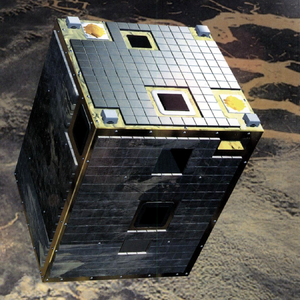Indian launch success for European micro-satellite
ESA’s micro-satellite Proba left the heat of the Indian equator on Monday 22 October 2001, to head for a chilly polar orbit, 600 km above the Earth’s surface. The spacecraft was launched at 04:53 GMT (09:53 local time,06:53 CET), as a piggyback payload on India’s Polar Satellite Launch Vehicle (PSLV), from the launch station at Shriharikota - a small island 100 km from Madras.
Proba (Project for On-Board Autonomy) weighs less than 100 kg, yet it packs a powerful punch. It has the revolutionary task of using the Internet to send data to Earth and is the first ESA satellite with fully autonomous capabilities - meaning it operates virtually unaided.
This box-like micro-satellite is carrying a varied payload, including a range of scientific and technological equipment such as CHRIS (Compact High Resolution Imaging Spectrometer), two Earth environment monitors, DEBIE (Debris In-Orbit Evaluator) and SREM (Standard Radiation Environment Monitor), and two imagers, all controlled by a powerful on board computer system.
Proba will collect a wealth of data of its own accord, without the need for instructions by ESA ground staff, and once the images of Earth and environmental data have been gathered, Proba will send it to ESA's ground station at Redu, Belgium, and on via the Internet to waiting scientists.
“Despite a slight delay in the launch due to unfavourable weather conditions, the Proba mission is well on its way,” said Frederic Teston, Proba’s Project Manager. “The micro-satellite will undergo three months of testing, and then scientists can begin to make use of the important data delivered by this pioneering satellite.”
Proba is expected to operate for at least two years and is a joint project between ESA and prime contractor Verhaert Design and Development of Belgium, along with a number of other European and Canadian universities and companies.






